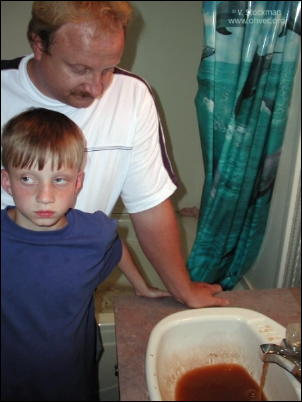
Household water burns skin on contact in southern West Virginia
Photo courtesy of www.ohvec.org
Two years after it was asked, the Department of Environmental Protection can't answer a question that worries thousands of West Virginians.
It's the practice of pumping wastewater from coal washing into worked-out underground mines.
Most evidence shows it taints water systems, poisons wells and destroying the health of coal field residents.
The coal companies say it is not a problem.
"If this was an outbreak of any other source, the Centers for Disease Control would be there finding out what's happening and what's causing it," said Sen. John Unger D-Berkley.
The WV Legislature, long legislating in support of coal activities, blasted the state's DEP for failing to answer the question, after being given the task two years ago.
The DEP says it is hiring a third party outfit to finally do a study, with some legislators saying that's DEP's job.
Two Boone County towns whose water is so bad that it stings the skin and can't be used for bathing or cooking, have filed a lawsuit.
Residents of a northern Boone County community say their well water is "too toxic to touch," so they're trying to raise $15,000 to deliver barrels of clean water to about 300 homes.
Community organizers say the contaminated water in Prenter Hollow has caused widespread health problems, including high rates of gallbladder and kidney disease. Children also suffer from unexplained urinary tract infections and tooth decay.
"The water is not good for human consumption," said Glen Collins, a volunteer organizer with the Prenter Water Fund project. "But some people are still drinking it. They're bathing their children in it. They're cooking with it."
The state has beat the horse to death over toxic sludge, ignoring sound environmental principles, with the fear of losing coal taxes and West Virginians losing production jobs associated with mountaintop removal.
Common sense anti-pollution standards are ignored, forcing opponents to file lawsuit after lawsuit to protect the public.
Robert Kennedy, Jr., while visiting West Virginia in 2007 said, "If big people don't care, we should at least accept this is about the health and life of the state's children."
In West Virginia, coal pollution is accepted as part of living here, the coal companies generally ignore millions of dollars in fines.
DEP Director Randy Huffman says he can't answer the question: "Is drinking water or human health at risk when a chemical soup from the cleaning of coal is pumped into worked-out underground mines?"
At least 15 coal companies are allowed to inject the waste back into the earth at 15 locations.
The DEP cannot say what's in slurry, how much is injected, or whether and where it migrates.
In 2006, lawmakers ordered a review of sludge, actually demanding details on its chemical composition and possible health impacts.
About 250 people with orange and black water in their taps are suing eight coal companies they believe have poisoned their water in two southern West Virginia communities.
The lawsuit targets Massey Energy and four subsidiaries, and West Virginia's Federal Coal Company.
"The tragedy in Prenter and other Appalachian communities is that folks had good water, then over a period of time, their water gradually degraded to the point where it is obviously not fit for bathing, much less cooking and drinking," said Benjamin Stout, a Wheeling Jesuit University biology professor who has tested well water in Prenter.
"During that period of degradation, they have been unknowingly exposed to high levels of metals that have well-known human consequences," he said.
Pam Johnson, a registered nurse who's surveying Prenter residents about health problems, said 98 percent of adults have gallbladder disease.
Johnson said, "Before I went down there I thought that people were exaggerating their problems, but when I got there, I realized they were under-reporting their health problems."
"There's a 5-year-old with a full set of dentures," Johnson said.
Maria Lambert told media she never had clear, odorless, tasteless water. Sometimes it felt greasy or smelled of rotten eggs. But the day a blast from a nearby strip mine shook her southern West Virginia home, it got worse.
"Immediately, there was slime that ran through the ice maker. It just looked like orange Jell-O," Lambert recalls.
| 


